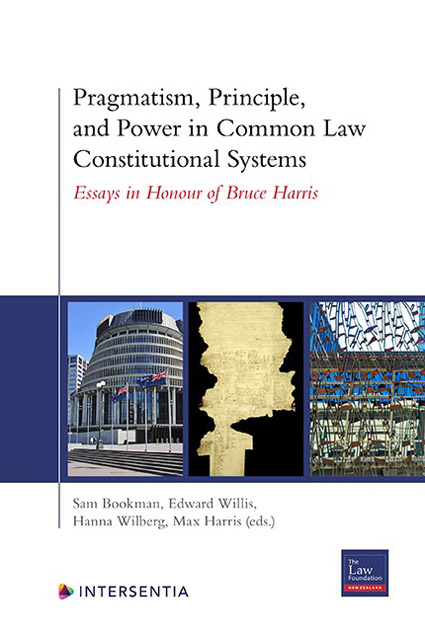 Pragmatism, Principle, and Power in Common Law Constitutional Systems
Pragmatism, Principle, and Power in Common Law Constitutional Systems Book contents
- Frontmatter
- Foreword
- Preface
- Contents
- The Writings of Professor Bruce Harris
- List of Cases
- List of Contributors
- Introduction
- Part I The Nature of Executive Power
- Part II Issues Concerning The Judiciary: The Nature of Judicial (and Executive) Power
- Part III Issues Concerning The Judiciary: Creativity and Pragmatism in Judicial Method
- Part IV Issues Concerning The Judiciary: Judicial Appointment and Accountability
- Part III The Nature of Unwritten Constitutions and Their Future
- Index
Introduction
Published online by Cambridge University Press: 19 November 2022
- Frontmatter
- Foreword
- Preface
- Contents
- The Writings of Professor Bruce Harris
- List of Cases
- List of Contributors
- Introduction
- Part I The Nature of Executive Power
- Part II Issues Concerning The Judiciary: The Nature of Judicial (and Executive) Power
- Part III Issues Concerning The Judiciary: Creativity and Pragmatism in Judicial Method
- Part IV Issues Concerning The Judiciary: Judicial Appointment and Accountability
- Part III The Nature of Unwritten Constitutions and Their Future
- Index
Summary
No doubt there are many different markers of success for an academic career. If pressed to articulate some of them, many of us might point to one or more of these common standards for intellectual achievement: breadth and depth of scholarship, engagement from critics and interlocutors, development of novel ideas and avenues for research, and perhaps the everyday usefulness to society of one's intellectual contribution.
Bruce Harris's academic career has more than seen these standards met. He is expert in New Zealand public law, having taught and published in the field for more than 40 years. Harris graduated with a Bachelor of Laws degree (with Honours) from the University of Otago in 1974 and a Master of Laws degree from Harvard University in 1975. He was admitted as a barrister and solicitor the following year, and spent two years in practice with a focus on resource management law (a focus reflected in his early academic work). Harris then returned to the University of Otago Faculty of Law where he would teach and research for the next 17 years, before moving to join the Faculty of Law at the University of Auckland in 1994. His commitment to faculty life saw him appointed Dean of Law at each of those two proud universities during his tenure. and, of course, a number of academic accolades have followed, including the Sir Ian Barker Prize for Best Published Article in 2007, and the conferral of a Doctor of Laws degree from the University of Otago in 2012.
In terms of scholastic output, the culmination of Harris's expertise and experience was the publication of New Zealand Constitution: An Analysis in Terms of Principles, which provides a comprehensive yet highly accessible account of how New Zealand's constitution operates. It also reflects Harris's highly pragmatic style of public law scholarship, which strips the law of pretence while somehow losing very little of its nuance. One colleague noted not long after its publication that it deserved to sit alongside the Cabinet Manual as an essential resource for all new Members of Parliament. Experience already tells us that a number of law students also now rely on it as a first port of call when examining constitutional issues for the first time.
- Type
- Chapter
- Information
- Pragmatism, Principle, and Power in Common Law Constitutional SystemsEssays in Honour of Bruce Harris, pp. 1 - 10Publisher: IntersentiaPrint publication year: 2022


